
Daring, original and crazy South Korean horror.
Na Hongjin continues to establish herself as one of the most exciting creative voices in South Korean cinema. With The Wailing he is more ambitious, original and delightfully crazy than ever before."Not everything that moves, breathes and talks is alive"
The film's original title is Gokseung, which is the name of the sleepy little South Korean mountain village where the story takes place. The residents live simple lives, everyone knows everyone and the police force has nothing meaningful to do. All this changes when a mysterious Japanese man (Jun Kunimura) settles in the village. Right after his arrival, horrors begin to happen when some villagers seem to suffer from some kind of physical and mental illness. First, they lose their minds completely and go on a violent rampage against themselves and others, followed by an inevitable and painful death.
Primarily, we get to view the course of events through the perspective of police officer Jong-Goo (Kwak Dowon), as the uncontrollable chaos moves closer and closer to his personal sphere. Like the other villagers, he struggles with increasing paranoia and an increasingly important question: Do the events just have something to do with hallucinatory mushrooms in the forest, or has the devil himself come to Gokseung?
You're never quite sure of the answer, but the events get steadily weirder and the plot more complex as the game progresses. When the film's credits roll, you have at least as many questions as answers, which I love. It will take a number of rewatches for me to really grasp everything that is happening in the film, get total clarity on the character dynamics and such, but that does not mean that this first experience is weaker.
The atmosphere and aesthetic that director and screenwriter Na Hongjin builds up is incredibly immersive and enchanting and even if I don't always have a full grasp of exactly what is going on, I lose myself in the film completely. Some scenes in the second half - Such as those involving the shaman Il-Gwang (Hwang Jungmin) - Are so wildly crazy and unforgiving that some of the audience will give up. It's a shame, because if you go along for the ride and surrender to the fun and originality, it really pays off in the end.
Despite the fact that the film is almost 160 minutes long, it in no way feels drawn out or tough, but the tension is constantly sky high and in large parts of the film you really sit on pins and needles waiting for the next development. Visually, it does not disappoint either. Cinematographer Hong Kyungpyo has previously shot gorgeous films such as Sea Fog, Mother and Snowpiercer and here goes all in with the rainy, foggy and ghostly mountain environments. It's an endlessly eerie place, but you don't want to leave.
The constantly fascinating characters probably also contribute a lot to that. Kwak's police officer is further proof that South Koreans have an extremely unsympathetic image of the country's police officers, but despite being clumsy and slightly incompetent, he never becomes some sort of simplistic caricature or parody. The acting he delivers is truly impressive and the portrayal of the growing desperation is flawless. Kunimura and Hwang also give really strong performances, but the sharpest is Chun Woohee in a role that you should know as little as possible about.
In terms of horror, I think the film is very reminiscent of Robert Egger's masterful The Witch in how it slowly and confidently builds pure terror that crawls under one's skin, but the few times the violence completely explodes, nothing is held back. That arrangement makes The Wailing hit very deep and hard, and I have a feeling it will be a long time before it completely lets go of me. A fantastic film, simply.
Was this review helpful to you?
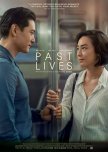
A completely perfect movie about love!
Past Lives is a rare love film, touching with its adorably simple visual language and accurate, but few-worded dialogue. The silence in this drama is more telling than spoken words could ever be.Love theme on film is about as worn out as a book on the bookshelf. Most varieties of complications and other entanglements, we have already seen unfold from various different angles. What is happening here is not really an exception. We've seen it before, but rarely has it been this wonderful and poignant. Playwright Celine Song, making her feature film debut, has both written and directed this subtle, and constantly vibrating masterpiece.
Past Lives is about Na Young and Hae Sung. We meet them as young kids at home in Seoul, when they are an innocently blushing couple, a boyfriend and a girlfriend. When she moves with her family to Canada, they lose touch. Many years later, they look each other up on Facebook and begin an intimate digital relationship. They are close despite the distance and can and do talk about anything. After a while, Nora (as Na Young is now called), to Hae Sung's great sadness, wants to take a break. Real life soon resurfaces, and they both begin new relationships. The feelings still remain and when they see each other many years later, their friendship is tested, but also their loyalty to their partners.
In a way, this is a classic triangle drama. The story revolves around two people, and mainly affects a third. The focus is on Nora and Hae Sung, and it is their lives and longings that we get to share, and it is them that we care about. At the same time, no drama happens in a vacuum, and their actions and choices will cast a shadow over others as well. This is a film about feelings, and about love then and now. It is also about past lives and about fate, but also about accepting what has become, and not chasing what could have been.
Song has written a story that creates shockwaves of emotion in us viewers. The film lies in wait with its seemingly unassuming style, and shoots emotional arrows at us when we least expect it. The experience is heartbreakingly sweet, honest and at the same time so painful that it tears me up inside.
At first glance, the photo is not very remarkable, but still everything is so incredibly beautiful and the color tone is pleasant. The camera makes interesting horizontal runs, as if in a circular movement, which envelops the drama, but which also carefully highlights what pulsates at its core.
The dialogue is sparse, with many, long gaps of silence. However, it is never long-winded or uneventful in these, because it is often in the silence that the drama takes place. What is not expressed in words is expressed in everything else we see, in the looks, in the awkward smiles and the intensely contradictory longing for what never was. Song relies on the power of stillness, but also on her tight acting trio of Greta Lee as Nora, Teo Yoo as Hae Sung and John Magaro as Nora's husband Arthur. They are all convincing and do everything exactly right. It's hard to explain what makes their acting so good in this, because it's really about the fact that it's not an acting we watch. They don't play, they just are. It is their presence in the situation and their trust in the story, which radiates such obviousness that it rubs off on us.
Past Lives is a fantastically fine and multifaceted film, as beautiful as it is painful and as low-key as it is explosive. As the film moves towards its inevitable end, there are questions left unexplained, but there's no rush in me to get any answers. The magic is in the enigmatic and unspoken, and when the film ends, I end so with tears in my eyes, but with a wide smile in my heart.
Was this review helpful to you?

This review may contain spoilers
A piece of epic film history.
Dark sky, gray shadows moving across the ridge. Akira Kurosawa could get top marks for Seven Samurai just because he created the legendary war scene where a troop of soldiers ride over a hill on their way to the battlefield, or because he wrote side-long backstories about each leading character and made an intricate family tree over the 101 villagers. This is an epic mammoth film, but today perhaps best suited for cineastes.The plot is simple: Japan, 16th century, feudal society - It's sweaty, dusty and bloody, especially if you're a peasant. The population of the small mountain village is constantly subjected to bandit attacks, especially in the fall after the year's harvest. The men in the village therefore decide to hire 7 samurais to protect them from the horrible miscreants. The first man to stand up is the wise Kambei, who later hires 6 more ronin. Is this incredibly exciting? Absolutely, if you're willing to spend 3.5 hours watching dramatic Donald Duck-clad men laughing at jokes no one else understands. But if you want to see who combined it first: Slow motion + young woman falls in love with young fighter + group of heroes helping each other + men on a hill, this is where you should turn.
Just the intro is a 3-minute long explanatory text passage accompanied by pompous taikos. But hold on. From the first scene you are struck by the astonishing photo. Akira knew how to use the black/white format to the max. Small details such as the characters' patterned kimonos increase the nuances and make each frame attractive. The director recorded each scene with dual cameras in order to have a larger selection of images when editing. It's noticeable, because it's a fantastic variety of angles and perspectives. Some images are so beautiful that you could frame them as individual photographs. I especially fell for the contrast of the white daisies against the dark tree trunks. The sound effects and music are also interesting. I laughed out loud towards the end when the young woman whistled for a full hall. There are creaking hinges and humming men, but it never becomes blaringly loud, instead the music and sound effects stay in the background and act as a mood setter.
Although the film is, according to some, the first drama-action film, Akira has had his heart in the right place. Unlike now, the heroes aren't nerve-smooth and pumped with anabolic steroids. Here, the men have lovely round bellies, wrinkles and they actually cry when their pals die. The masculine lies in their enormously pent-up sexual frustration and that around every corner there seems to be a woman in distress with a crying child in her arms. The young woman who has a fling with the young wanna-be samurai is the only girl who has lines. I have full respect for that because the movie is from 1954. What scares me is rather the realization of how little the genre has developed since then: Braveheart, Gladiator, Kingdom of Heaven.
Just the comparison between this and more recent drama-action films makes me understand how big an influence it must have had. Not only because it is innovative but also because the story is emotionally driven. The atmosphere breathes gloom. The only thing I miss are characters that develop this way despite Akira's solid preparatory work with the portraits. It's only the funnyman Kikuchio who undergoes a major change. Despite the massive playtime, I never get a chance to go deep with a select few. Therefore, I don't really get emotionally involved in how the villagers and samurais are doing. This also applies to the dark forces that move around the village, the bandits, they have no face. They are more like a brutal, black shadow that thunders forward and devours everything in its path.
Despite its few flaws, it is still incredibly well made and interesting from a film historical perspective, but I think it takes a cineaste to really appreciate it. If you like to Google everything about the film after you've seen it, to create an overall picture and be able to put it into context, then you're the right audience.
Was this review helpful to you?
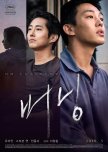
This review may contain spoilers
Masterpieces that enchant and amaze.
Class differences and deep obsession take center stage in Lee Chang-dong's dense Burning. One of 2018's masterpieces that is both shocking and fascinating."Everything is very uncertain and that is exactly what is so reassuring". That's what the character Tootiki said in the book Moomins and the Winter Wonderland, one of the most well-known Moomin books. And that phrase can absolutely be applied to Lee Chang-dong's film Burning with the slight change that it is not soothing but rather "magical".
When the Korean director returns to the big screen for the first time in 8 years after the fantastic Poetry, he has based the story on Haruki Murakami's short story Elephant Vanishes, but the film stands entirely on its own in the surprising plot.
In the beginning, we get to meet Jong-soo (Yoo Ah-in), a young man with a violent father who has to take care of their farm. Jong-soo himself is more interested in writing, but is hindered by his economic worker background. One day he runs into his childhood friend Hae-mi (Jun Jong-seo). They start hanging out and Jong-soo quickly falls in love with her, but when she goes to Africa for two weeks, things change.
When Hae-mi comes home, she has met Ben (Steven Yeun from The Walking Dead), a rich and well-to-do young man who lives in a lavish apartment and drives an expensive car. The trio begins to hang out, but after a long evening outside Jong-soo's house, unexpected and fiery desires are revealed and the plot suddenly takes a completely unexpected turn that makes Burning a fascinating mystery.
Lee works as usual with long takes, a 10-minute dance at a sunset is one of the closest visual poetry you can get, and portrays the contrasts in Jong-soo's and Ben's lives through both subtle and clear scenes. The film requires you to accept that it takes a while to get into Lee's naturalistic grasp, but once you do, you can't take your eyes off the screen.
The second part of the film, which becomes a kind of existential riddle, is absolutely fantastic. You have no idea how it will end, but the feeling of discomfort and uncertainty is palpable. What actually happened? Was the cat that Hae-mi wanted Jong-soo to take care of really exist? Who is Ben? When will his cravings strike next? The questions are many and not all will necessarily be answered, but Lee relies on the audience's intelligence to be swept up in the plot more than to analyze it.
The actors are excellent in their roles, the film is technically well-made with well-chosen music and the sound contributes to the tight atmosphere. Burning is simply fantastic on every level. A film that, like life itself, happens before your eyes and then refuses to let go when it's over. Like a passionate burn that never leaves your skin.
Was this review helpful to you?
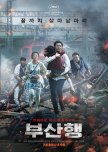
Get on board the zombie express.
Train to Busan can best be described as a Korean clash between Snowpiercer and World War Z. The Korean thriller's zombies and special effects are world-class, but the emotional bits can get a little cheesy.I can really appreciate when the entire plot of a genre film can be summed up in one sentence. A simple and effective concept that arouses curiosity: Snakes on an airplane. A tornado with sharks. Okay... you understand that it might not be the world's best movie every time, but you know exactly what you're getting, and if you go along with those premises, you're in for a while of good entertainment.
So what happens when you put a zombie on an express train? It doesn't take long, of course, for things to go off the rails. Bloody chaos as more and more people are bitten, the survivors' fight for life and death. Being trapped with the living dead in tight spaces is never a good idea if you ever find yourself in that position. It's claustrophobic, and really rough.
The conflicts that arise among the group of people, the fear that breeds mistrust and selfish thinking, are not new. Countless Stephen King movies have explored this with what happens to ordinary people in terrifying situations. It becomes more exciting, however, when zombies have to face the danger, as when a small group of passengers have to sneak past several carriages without becoming someone's dinner.
We need to talk about the zombies! Someone may have been inspired by World War Z and its hordes of the undead, and created equally insane creatures that you don't want to share a carriage with. They are really fast, and all rabid. They're not necessarily the smartest, but good nasty designed with their sickly faces and jerky movements. Arms and legs are twisted in unnatural directions - It's hard to tell where the intense effort of the actors ends and special effects take over.
The story in Train to Busan is bigger than what takes place on the train. The news tells about something that has happened around the country. "Zombie" is trending as a keyword. It looks and feels like a big, lavish disaster thriller, which has chosen to zoom in on a few really unlucky individuals. But if it sounds loaded and gloomy, then... Well. There's a kind of cheesy B-movie humor that makes us laugh, too. The occasional goofy zombie or cocky alpha male opens up fun elements and the audience seems to love it.
At worst, the pieces are meant to be emotional, where you touch so the strings bleed. The relationship between a guilt-ridden father and his neglected daughter takes up a lot of space, and sometimes becomes unnecessarily sentimental. The film is also longer than it needed to be, with several dead transport stretches. And just when you think we're at the end, it continues with a finale that should have been better - Or in any case completely scrapped.
Watch it with zombie-crazy friends and you have a wonderful and terrifying 2-hour journey ahead of you.
Was this review helpful to you?
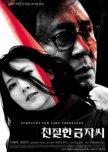
This review may contain spoilers
Freezing and terrifying.
Lady Vengeance appears at first sight as a strong emotional drama, seemingly almost a pleasant film. But if you just scratch the surface a little with your fingernail, you'll soon discover a print mood so unsettling you can almost touch it.For over 13 years, Geum-Ja has been imprisoned. The reason is that at the age of 19 she pleaded guilty to the kidnapping and murder of a 5-year-old boy. But the confession was not the whole truth and a burning desire for revenge now hangs in the air.
Starring Lee Young-ae performs pure magic sweetly. Her face is at times so incredibly innocent - Completely glowing with warmth and good intentions, then, in the blink of an eye, turns to a harsh emptiness, tart and defiant anger and contemptuous nonchalance.
Every frame in Lady Vengance is so well thought out that it amazes you. Small surreal details inserted with a sure hand reinforce the impression that it is a unique film. Geum-Ja's story moves easily and smoothly between flashbacks and the present, while the fates of her fellow prisoners are inserted like puzzle pieces into her detailed revenge plan. Through an incredible manipulation, Geum-Ja connects more and more people in the prison - Each one fulfills a purpose and is used just as obviously. In the prison, people begin to discern the two faces of our Lady Vengeance, as she is called Geum-Ja the Kindhearted and Geum-Ja the Witch. One expressed with warmth - The other with an involuntary respect. Because for 13 years she has successively won over, exploited and helped all the people she coldly expects to need in the future and wrapped them around her fingers. Because vengeful women banded together are capable of anything.
As a film, the action moves continuously, which helps to keep the tension razor sharp. Although it is calm and serene, there is a constant awareness that it is an apparent calm that heralds a violent storm and the air crackles more and more with charged electricity. With simple means at hand, one becomes disgusted, saddened, imprisoned, All the while one is unsure which of the faces Geum-Ja shows is her true self - Or if she even knows it herself.
What makes Lady Vengance such a remarkable film? Because it is probably not a film that suits everyone. You mustn't be too restless for this movie, you mustn't expect classy action and choreographed fights, you mustn't expect a fast pace.
The contrast is most dazzling when all the slow, beautiful stillness is set against the raw and brutality of revenge. Nevertheless, if you have seen director Park Chan-Wok's previous films Sympathy for Mr. Vengeance and Oldboy, you risk being disappointed. Lady Vengance puts an end to the director's revenge trilogy and is light years from the previous ones. It is characterized by incredibly less violence and at the same time manages to create a greater discomfort than the other films. It is closer to the Korean horror film A Tale of Two Sisters because it creeps up on you like cold ridges along the spine.
The violence we see has nothing hollywoodized about it, there is no high tech Matrix aesthetic here, it is close, harsh and leaves most to our own imagination. When a group of middle-aged people discuss weapons, draw lots for turn order, and protect their clothes from blood splatters, logical reasoning about the execution of revenge is one of the scariest things I've seen in a very long time.
If revenge is best served cold, then Lady Vengeance is perfection. Frosted so cold you get goosebumps just being near it. When you take it in, it's like swigging a whiskey on the rocks.
Was this review helpful to you?

This review may contain spoilers
An ambitious firework without a foundation.
To save Earth from colliding with Jupiter, a group of young people must work together to save humanity. Despite an enormous ambition and budget, the film is let down by one-sided characters and sometimes excruciating dialogue.The Wandering Earth is by far the biggest science fiction film made in China. Based on the book of the same name, with a production budget of $45,000,000, this is a major milestone in China's film industry.
In the near future, the Sun has begun to expand, and within a few years all life on Earth will cease to exist. Humanity then hatches the idea to build 10,000 giant mountain-like engines that will cover half the earth's surface, and turn the earth into a giant spaceship that will then fly away from the sun in search of a new source of energy. I'm not making this up.
During the flight from the sun, the surface of the earth is frozen and all the people have been moved to underground cities, but one day two young people want to sneak up to the surface and experience it for the first time since the expansion of the sun started. Suddenly, they are drawn into a rescue mission, when Earth's engines stop working and must be repaired before our planet ends up on a collision course with Jupiter.
This film is ambitious. Incredibly ambitious. We get to see everything from gigantic, detailed space stations, to frozen cities, to pictures of planets that could just as easily be beautiful paintings. It's noticeable that a lot of time and money has been spent on the production value, and it makes the whole film feel bigger than many other disaster films we've seen in Western films in recent years.
There are exceptions when it comes to special effects though. Unfortunately, the characters spend a lot of time driving around in cars, and the car chases look like they're from any playstation game from 2004. It's immediately apparent that it's 100% made in a computer, and it's eye-popping when you see it.
As ambitious as the film is, it is action-packed. It feels like they have moved away from the classic structure with three acts, and instead went straight to the third act. You start the film with a disaster, and from the fast start the film doesn't want to slow down. It is certainly something that is common in disaster films, but it would have been nice to have a couple of scenes where you can catch your breath. However, the film gets better in the second half, when the main characters come together and are given a mission that is easier to follow.
What brings this movie down is unfortunately the characters. One character is supposed to be a typical humor sidekick, but just comes across as a screaming, annoying form of Jar Jar Binks. Another should be the restrained protagonist who only sees darkness and negativity. It is hard to care about them when they are so one-sided and exaggerated in their behavior. Then add that the supporting characters spend a lot of time in their spacesuits, which makes it difficult to keep track of who is who.
Something else you could have put more love into is the dialogues. At times you might think that a beginner has written them. When our main antagonist tells his sister about the 10,000 engines and why they exist, it's clearly a conversation that exists for us as the audience to get that information. The sister of course already knows this, as it's the reason they've been living underground for 10+ years.
Unfortunately, I'm having a hard time getting into The Wandering Earth. After a bad start with subpar special effects and hard-to-love characters, I can't appreciate the huge spectacle that the second half of the film offers. It's ambitious, lavish and brave, but when I don't get a sensible human entry point, it stops at superficial fireworks instead of something deeper.
Was this review helpful to you?

Well made and shocking.
Director Zhang Yimou does not shy away from horrors. He avoids pushing our noses into the violence, The Flowers of War is after all a drama and not a splatter film. And it is a drama, a well-made and thoroughly well-acted one.Christian Bale notwithstanding, The Flowers of War was not made with American money (and apparently only the second all-Chinese film ever with a Hollywood star in the lead role), which may explain why it never made it to cinemas in Sweden. Because films that are not Swedish or English rarely do. It's certainly not a masterpiece, I don't intend to go that far, but surely there would have been room for a larger audience.
In The Flowers of War, Christian Bale plays a not-quite-clean funeral director, John Miller, who goes to a Catholic church in Nanjing, China, to take care of the dead priest there. But it is not very simple, because it all takes place during the so-called Nanjing Massacre, and there is chaos both on the way to and in the church. Where there is also only a group of children, with one exception consisting of girls, left. The not-quite-clean-haired undertaker decides to stay for a while, he has to get paid, and soon finds himself in a protective position he never asked for.
A history lesson might be in order, if you, like me, have never heard of the massacre in question. There was a six-week period after the then-capital of China, Nanjing, fell into Japanese hands, during a Japanese invasion of the country in 1937 (the Second Sino-Japanese War), when invading soldiers in the most heinous ways raped and murdered mostly Chinese civilians in and proximity to the capital.
Director Zhang Yimou (who has, among other things, fairly well-known Hero and Flying Daggers to his name) does not shy away from horrors. He avoids shoving our noses into the violence, The Flowers of War is after all a drama and not a splatter film, but it is somehow, in or out of picture, ever-present. From the initial attack to the aftermath of inhuman acts. Efficient. Nasty.
And it is a drama, a well-made and downright well-acted one, and without checking numbers I'd venture to guess that it was made on a sizable budget. Then it's a bit of a shame that it falls a few times along the way. There are no deep pits, but various small shortcuts in the story and one or the other forced emotional moments can still disturb. Although it's clear, by all means, it's still a lot better than the average modern Spielberg film.
Comments regarding Christian Bale's effort should be redundant, at least if we assume that people generally think his efforts are shitty. And I belong to these general types.
Was this review helpful to you?
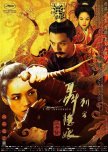
Stunningly beautiful but frustratingly slow.
If you're in the mood for beautiful artistic 9th century style, long takes and a complicated story in a slow film, then The Assassin is probably your cup of tea. If you want to see a cool martial arts movie - Watch something else.When you see The Assassin you are faced with the age-old question: What makes a good movie? Some prefer a strong story, others powerful effects. Here, a story that arouses no great interest is combined with an artistic style that is unlike anything else.
For those who follow the story, it is about a female assassin in 8th century China. Like many assassins on film, she is faced with the classic dilemma of having her loved one killed or failing her duty, something that meant slightly greater consequences at the time.
If you are looking for a juicy story, you need to have both a lot of concentration and patience, because the director Hou Hsiao-hsien is hardly someone who prioritizes pace, forward-looking lines or clear character development. We're talking sometimes forever-long takes, extremely sparse or no dialogue and scenes that work more like art installations.
Undoubtedly, it is a stunningly beautiful film. The environments, the scenography, the costumes - Almost every single frame is like a painting or the most delicious photograph you've seen on a cinema screen. One could practically watch the film without sound and admire the impressive work of the film's creative team.
With that said and the cool visual style aside, it's a frustratingly slow film to get through. As a contrast to the often overly clear film narration in, for example, American cinema, this becomes almost incomprehensible and unnecessarily complicated.
The fight scenes are the highlights - Not because it's exciting but because of the quiet and calm style. But it's still one of the most boring martial arts movies out there. It is a perfect example of "see but not feel" - Gentle on the eyes, but you leave the salon with a slightly empty and unsatisfied feeling.
Was this review helpful to you?
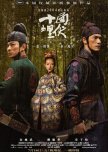
Hero director back with new spectacular action.
The Asian martial arts film has become in the 21st century what spaghetti westerns were in the late 60s. Many films take more and more from the mystical East in terms of fighting and spirituality. The pioneer for this was of course Ang Lee's Crouching Tiger, Hidden Dragon which became the first non-English language film to gross over 100 million dollars in the US. There was also an Oscar for best foreign film. The legend Zhang Yimou was not slow to follow up with the visually stunning Hero. Common to these films was also a certain Zhang Ziyi, an adorable young lady who, if Yimou can be likened to Sergio Leone, can be likened to a feminine Clint Eastwood.Now Ziyi and Yimou collaborate again in the new Flying Daggers and the result is just as good as you think. There are grand vistas, gravity-free fight scenes and a dance scene that defies description. In the beginning, we meet the police officers Jin (Takeshi Kaneshiro) and Leo (Andy Lau), who have been given a mission to find the leader of the rival group Flying Daggers. They hear that a new suspicious girl (Ziyi) has started at the local joy house and head there to investigate. Soon the intrigues are underway and, in order not to reveal the most interesting twists, it can be said that a triangle drama, which could be signed by Shakespeare, arises. It's lies, fake roles and betrayal in a nice mix, even if the plot sometimes thinks it's smarter than it actually is.
The most serious problem with the film is really a lack of variety. Crouching Tiger... stood out for its incredibly beautiful love story and sweaty action scenes, while Hero was perhaps the most beautiful thing ever made on film. Flying Daggers certainly does not lack talent, all the actors excel and Yimou is technically a genius. But the story sometimes feels alarmingly empty and the fight scenes strangely familiar. That's why I like to draw the parallel to western films. They were basically all the same, you loved each other and everyone loved you. Asia freaks won't be disappointed, I certainly wasn't, but at the same time it's good to raise a warning sign of a creative impasse. It would be a shame if such a wonderful genre was neglected.
FYI: The film's original title Shi mian mai fu roughly translates to Ambush from ten directions.
Was this review helpful to you?
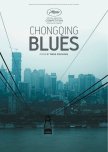
A visual piece of film.
From Asian latitudes, Chinese director Wang Xiaoshuai serves serious family drama with the classic father figure at the center. Although heavy on symbols, it is coolly performed, well played and a whole that feels magnificently composed.The points of contact are many and emotional as Father Lin returns to the family he once abandoned. His son has died in a hostage drama and the loose ends of the past are exacting their toll.
Absent fathers, also known as the ultimate pigs, have long been a constant companion. It seems we all suffer from the loss that only an absent father's embrace can cause and the question looms, are all fathers pigs? The setup here is already clear and rather it is about a human exploration in the art of abandonment.
In this way, Chongqing Blues is far from an innovative film, possibly more sigh-inducingly boring. But despite many prejudices, this is a beautiful film, not only on the surface but also in content. Admittedly heavy on symbols where Xiaoshuai seems to want us to read way too much into a look, movement or thing, bordering on sentimentally careless but by all means, it works.
The portrait of the father who has left his wife and child is brilliantly done by Wang Xueqi as he tries lostly to collect the rubble of a life. Neither over-the-top nor explosive, a strong ensemble overall succeeds in conveying a touching story through deep if not always long-lasting characters.
The visual composition is very similar to the narrated core of the film. The further you get, the more impressive becomes Xiaoshuai's slickness in terms of cutting and eye for picture details. The cross-cut flashbacks in particular send pleasant shivers through any movie buff.
And the interest in a not entirely original film is sustained by concrete content. It is thoughtful and purports to be an exploration into parenting and confession. It will hardly be to everyone's taste, Asian father drama, that goes without saying, but Chongqing Blues is a visual piece of film that is worth your time and attention.
Was this review helpful to you?
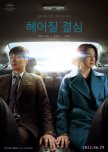
Masterpiece cast in silky noir.
The ultra-violence of the revenge trilogy feels distant when the Korean visionary Park Chan Wook serves delicious romance of the absolute highest class.The irresistible scent of classic noir hangs like a dense fog over Park Chan Wook's latest opus. Decision to Leave (2022) undeniably has films like Double Indemnity (1944) and Vertigo (1958) to thank, but at the same time, Park Chan Wook is refreshingly unique in his filmmaking and voice as usual. It is not long before what is initially very "Hitchcockian" and familiar is taken in completely unexpected directions.
The story begins in an accident investigation led by the chronically melancholic police officer Jang Hae Joon (Park Hae Il). A middle-aged climber appears to have fallen from the mountain he was climbing and died instantly when he hit the ground. Most of Hae Joon's colleagues shrug their shoulders and want to shrug it off as quickly as possible, while he himself begins to turn the magnifying glass on the deceased's mysterious widow, Chinese Song Seo Rae (Tang Wei). Her cold nonchalance about what happened and her murky background means that Hae Joon is no longer so sure that her fate was an accident. The instant chemistry that develops between the two further complicates the case.
So far it feels like movies I've seen before but every minute of playtime me further away from them. What could steer towards a conventional investigative thriller instead becomes something far more dreamy and sublime. What generally results in something cold and hard instead turns into something warm and silky. With each passing scene, it becomes increasingly clear that the murder mystery and its "whodunit" question is completely subordinate to the central relationship and that it is a love story unfolding on the big screen, albeit a strange one. The corpses that keep turning up are just icing on a cake of passion and longing. Park Chan Wook's transformation into bloody romantic (something already noticed in 2016's The Handmaiden) is total, and I love it.
Given that's the direction Park Chan Wook chooses, it's Tang Wei and Park Hae Il that everything hinges on, because if you don't buy their almost Phantom Thread twisted romance, everything else falls like a house of cards. Fortunately, there are sparks about them from the first frame they share and it is with ease that one capitulates to their restrained "courtship" of each other. Hae Il's portrayal of someone stuck on autopilot in career and marriage only to gently thaw back to life is utterly devastating, and Tang Wei's multi-layered, vulnerable and utterly unique femme fatale interpretation will carry with me for a long time.
As always with Park Chan Wook's filmmaking, he maximizes the visual potential of every frame. Here he is more playful than in his previous works and allows everything from smartphones to GPSs to merge with the visual language and the result feels as hypermodern as it does classic. Aesthetically, he continues on the trail he opened with 2018's The Little Drummer Girl, allowing both set design and costuming to rise far beyond realism. There are strong reds, strong blues and strong greens, almost to the point that Pedro Almodóvar feels like a possible source of inspiration. Few filmmakers can pull off a visual feast of this breathtaking caliber.
When the incredible finale (incidentally the obvious peak of a film that conquers the epithet masterpiece in every scene) is over and the credits roll, I can't help but think of Michael Gambon's narration in the Coen brothers' Hail, Caesar! (2016) and how he describes a film- "A potion of balm for the ache of a toiling mankind". That's exactly what Decision to Leave is, a soft and healing balm for the heart, brain and soul.
Was this review helpful to you?
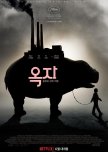
Beautiful vegetarian propaganda.
A grand fantasy adventure that is fantastically entertaining and beautiful. Okja is a charming, funny and thought-provoking family film which, however, is not directly suitable for the youngest, but will amuse many others.The fact that the Netflix-produced film Okja competed in Cannes raised a few eyebrows among the traditionalists. However, you have to think outside the box when you turn 70, and that's what the festival did in 2017.
The South Korean Bong Joon Ho, the man behind films like The Host and Snowpiercer, has written and directed this cute and visually spectacular fairy tale, with very dark tones between the lines.
The film is not easy to categorize as within its framework there is about as much comedy and farce as deep-seated drama and action. It is precisely this that gives the film extra points for innovative thinking, but at the same time risks making it somewhat difficult to grasp for parts of the audience, and above all it becomes difficult to say who its intended target group actually is.
The film is a kind of platonic love story between a girl and her pet.
Okja is one of all genetically engineered superpigs larger than a hippopotamus and has grown up with Mija, a little girl who lives up in the Korean mountains with her grandfather. Mija and Okja are best friends and really stick together through thick and thin. One day, however, everything changes when the Mirando Corporation, which once created Okja to become cheap food for the people, comes to bring her "home". But Mija is not one to give up on her friend so easily and encouraged by an animal rights group, she travels to the other side of the globe to save her life partner.
Essentially, then, the film is about unlikely but oh-so-strong friendship and takes place with the corrupt and sleazy (on more than one level) meat industry as a background. At the same time, the film conveys important messages about how the resources on earth should be distributed and urges us consumers to think. This is unusual in a film for younger people but all the more important for us all to take part.
A pale and easygoing Tilda Swinton plays the cool and calculating Lucy Mirando who is the CEO of the heartless company intent on mass producing cheap meat. And of course she is perfect in the role. Her colleague, the eccentric zoologist Dr. Johnny Wilcox is played by an energetic Jake Gyllenhaal who is quite funny, although perhaps not as convincing. Admittedly, it's a lot of fun to see him doing slapstick and rampaging around like I've never seen him do before, but it's grossly overplayed and not always justified. To some extent, it is certainly forgivable to stretch the expressions, as both his and Tilda Swinton's characters are caricatures, although it feels like Jake Gyllenhaal is sometimes almost having a little too much fun himself, at the expense of a lot of credibility.
Other roles include the always-watchable Paul Dano, Steven Yeun and Lily Collins. Young talent Ahn Seo-Hyun plays Mija and succeeds in an unexpectedly convincing way in creating a relationship with a giant animal that is mostly computer-animated.
Okja is a different and very nice film that absolutely deserves its audience. It's a bit uneven between turns and I sometimes feel that the humor should have been turned up a bit, only to suddenly feel that it could have been toned down. This ambivalence is a little disruptive to the overall experience and I would have liked Bong Joon Ho to decide to take it either way.
In the end, despite some flaws, this is a very lovely and heartwarming film that I undoubtedly enjoy very much.
Was this review helpful to you?
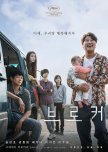
This review may contain spoilers
A melancholic road trip about abandonment.
In his first Korean-language film, Shoplifters director Hirokazu Kore Eda takes us on a rewarding road trip with an odd group of abandoned people. Think Little Miss Sunshine but instead of a beauty pageant, the group tries to sell a baby on the black market... Literally.At one point, Sang Hyun and Dong Soo are described as child brokers, and considering the kind of business they run, that's probably an apt description.
In some countries, such as South Korea, there are so-called baby hatches where mothers can anonymously leave their babies behind (there are arguments for and against the system that will not be elaborated here). Dong Soo, a baby hatch worker, together with Sang Hyun, a laundry owner, decide to steal a baby to sell to rich and desperate couples who cannot cope with South Korea's complicated adoption laws.
So Young, the young mother who abandoned the baby, discovers them and decides to join them on a road trip to find the best candidates to adopt her child. Broker is about responsibility and forgiveness. It reflects on the family we find in the course of life, and the family we have to let go of along the way.
What Sang Hyun and Dong Soo do isn't very moral, it's a form of human trafficking after all, but the movie doesn't show them as bad people. At the same time, So Young is not a bad person either, even though she tried to abandon her child. The central characters in the story have all been abandoned in some way, be it a divorce or in an orphanage. They all want to give this child a good home with a financially secure family, and they know that won't happen through the legal system of their country.
It is a tragic but poetic coincidence that Broker was released at the same time as the news about abortion rights in the US. The film may feel a little different now because of that, but the focus here is on children who, due to circumstances beyond their control, feel they shouldn't have been born. In Broker there are no decisions that feel right. How can one even choose when it comes to possibly abandoning their child? The magic is how well Kore Eda maps that conflict.
With such broken characters, heavy themes, and dark thoughts about parenting and abandoning children, Broker could have resulted in a much more depressing film. It is thanks to how well Kore Eda is able to balance these ideas along with hope and humor that makes the result more uplifting. The deeper questions are there for anyone who wants to read into what the film has to say, but it's not a barrier to entry to a meaningful experience.
Was this review helpful to you?

Gripping drama about thieves who steal your heart.
That blood is not thicker than water is at the center of Hirokazu Koreeda's family drama Shoplifters. A beautiful film that offers both uplifting humanism and some unexpected twists.It is clear that Koreeda has family as his most important subject when making films. Or rather the lack of family. In previous films such as Nobody Knows or Like Father, Like Son (both prize winners at Cannes) he explores how to create your own community even if you are not born into it. That theme is most clearly repeated in Shoplifters.
Here, in the beginning, we meet Osamu (Franky Lily) and a boy who smoothly picks up goods in a store without paying. But on their way home, they suddenly see a freezing little girl who seems to have run away from her destructive parents. They decide that she can accompany them to their house, where 3 women, one of whom is a grandmother, also live. At first, the girl is waiting, but the slightly messy and loud gathering in the family means that she will soon be living there indefinitely.
At first glance, it is nothing more than that. We get to follow the lives of the various family members and see how they try to cope with everyday life with little money. And really that would have been enough. Koreeda is a master at portraying everyday situations that don't really have much to say, but are completely fascinating to us moviegoers.
But Shoplifters also have other sides. With about a third of the film remaining, Koreeda reshuffles the cards and takes the story to unexpected lands. It works surprisingly well and is a good move purely dramaturgically.
The actors are all excellent, not least the 2 children, and the film is tight, but beautifully shot in all its everydayness. As usual, Koreeda does not go for the sentimental, but mainly spices up the story with a humanism that is really felt right down to the heart.
Was this review helpful to you?
























